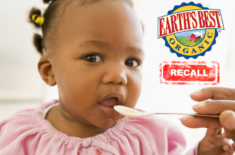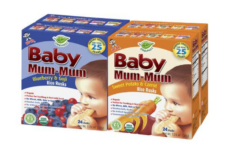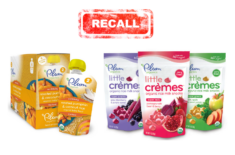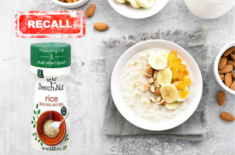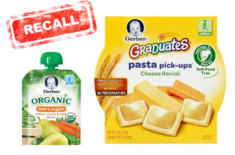Overview
According to a study, most American babies may be eating commercial baby foods. But as much as 95% of baby foods may have dangerous heavy metals like mercury, lead, cadmium, and arsenic. (1)(2)
What’s so alarming about this is that even low concentrations of heavy metals can harm your child’s body and brain development. It can lead to IQ decline and behavioral issues. (3)(4)
Sprout Organic Baby Foods by Sprout Foods, Inc. are among the top name brands trusted by many parents to provide proper nutrition for babies.
There have been no baby food recall advisories or product safety warnings from Sprout Foods, Inc. (Sprout Organic Foods) regarding any issue involving their baby foods.
But it’s also among the brands called out by the 2021 Congressional Reports on baby food safety for making products with exceedingly high levels of heavy metals. (5)
How did companies like Sprout Foods, Inc. react to the Congressional Reports? Was there any Sprout Baby Food recall issued afterward? Have there been any other Sprout products recalled in the past? Has the company figured in other baby food safety reports? (6)
The FDA announced in January 2023 that they’re imposing lead limits on baby food and opening a new food safety unit.
Find out more below.
Congressional Report On Baby Foods With Heavy Metal Content
First Subcommittee Congressional Report: Which Baby Food Brands Have Toxic Metals?
The Subcommittee on Economic and Consumer Policy of the House of Representatives released a detailed baby food safety report over the high heavy metal content on products made by popular manufacturers in February 2021. (5)
Headed by Chairman Raja Krishnamoorthi, the Subcommittee asked these baby food companies to submit internal policies and test results on heavy metals: (5)
- Sprout Foods, Inc. (Sprout Organic Foods)
- Nurture, Inc. (HappyBABY, HappyTOT, and Happy Family Organics)
- Beech-Nut Nutrition Company (Beech-Nut)
- Hain Celestial Group, Inc. (Earth’s Best Organic)
- Gerber
- Campbell’s Plum Organics
- Walmart Inc. (Parent’s Choice)
Only four baby food makers sent their test results and internal policies for the first Congressional Report: (5)
- Gerber
- Beech-Nut
- Nurture
- Hain
Campbell Soup Company (Plum Organics) was only able to provide these data in the second Congressional Report. But the rest, Walmart and Sprout, still didn’t update the Subcommittee with their internal policies. (7)
According to the first Congressional Report, these baby food manufacturers have dangerous levels of toxic heavy metals that exceeded government regulations several times. (5)
To ensure their products pass, the companies reportedly increased the maximum limits in their internal policies. (5)
For example, the FDA (U.S. Food and Drug Administration) set these maximum limits, in ppb (parts per billion), for bottled water: (8)
- 5 ppb lead
- 5 ppb cadmium
- 10 ppb inorganic arsenic
Instead of following the limits, these baby food makers increased their internal limits to much higher levels: (5)
- Hain (cadmium): 200 ppb
- Hain (lead): 200 ppb
- Beech-Nut (cadmium): 3,000 ppb
- Beech-Nut (lead): 5,000 ppb
Also, the maximum limit for inorganic arsenic in infant rice cereal is 100 ppb.
But these companies set their internal maximum limits to these: (5)(8)
- Beech-Nut (arsenic): 3,000 ppb
- Hain (arsenic): 200 ppb
- Nurture (arsenic): 115 ppb
The maximum limit for drinking water (but may also apply to food) is 2 ppb mercury, according to EPA (Environmental Protection Agency) guidelines. (9)
Sprout Foods, Inc. (Sprout Organic Foods)
Does Sprout Baby Food Contain Arsenic?
According to the Subcommittee, Sprout Foods, Inc. never responded. So, these test results for Organic Quinoa Puffs Baby Cereal Snack (flavor: Apple Kale) are from the HBBF report: (2)(5)
Inorganic Arsenic:
- Up to 107 ppb
Mercury:
- Up to 1.31 ppb
Lead:
- Up to 39.3 ppb
Cadmium:
- Up to 41.5 ppb
Other Companies In The Congressional Reports
Aside from Sprout Foods, Inc., these baby food makers were also listed on the Congressional reports: (5)(7)
Nurture, Inc. (HappyBABY, Happy Family Organics, and HappyTOTS)
Nurture is the only baby food maker that tested both its ingredients and finished products for heavy metal content. (5)
Yet the results were alarming, with many of its food products having high levels of toxic heavy metals. (5)
It turns out that Nurture doesn’t correct the products despite the test results. The company told the Subcommittee that the results aren’t used as a basis for product release. (5)
These are the toxic metal test results from Nurture, Inc.: (5)
Inorganic Arsenic:
- Up to 100 ppb – over 25% of Nurture baby products
- Up to 160 ppb – Strawberry & Beet Puffs
- Up to 160 ppb – Banana & Pumpkin Puffs
- Up to 180 ppb – Apple & Broccoli Puffs
Mercury:
- Up to 9.8 ppb – Banana Sweet Potato
- Up to 10 ppb – Brown Rice Cereal Canister
Lead:
- Up to 10 ppb – Nurture vegetable and rice products
- Up to 560 ppb – Multi-Grain Cereal Canister
- Up to 641 ppb – Blueberry Purple Carrot
Cadmium:
- Up to 5 ppb – close to 65% of Nurture products
- Up to 36 ppb – Strawberry Raspberry
- Up to 49 ppb – Multi-Grain Cereal Canister
Campbell Soup Company (Plum Organics) Results
Plum Organics refused to submit internal standards or any test results, according to the Subcommittee’s first report. The company insists on its finished products “meeting criteria.” (5)
The following are test results for Plum Organics (flavor: Just Sweet Potato) from the HBBF report: (2)
Mercury:
- Less than 0.142 ppb
Inorganic Arsenic:
- Up to 3.1 ppb
Lead:
- Up to 5.6 ppb
Cadmium:
- Up to 2.3 ppb
The test results of Plum Organics were finally included in the second Congressional Report. But the Subcommittee was alarmed that these showed alarmingly higher levels of toxic metals compared with the HBBF data: (7)
- Arsenic: Over 200 ppb arsenic – in 100% of Plum’s Super Puff rice-based products
- Lead: Over 5 ppb lead – in 54.5% of Plum Organics products
- Cadmium: Over 5 ppb cadmium – in 38.3% of Plum Organics products
Gerber Products Company
Gerber told the Subcommittee that it only conducts heavy metal testing in raw materials. (5)
Mercury:
- No mercury test.
Inorganic Arsenic:
- Up to 90 ppb – ingredient: rice flour
Lead:
- Up to 48 ppb – ingredient: sweet potatoes
Cadmium:
- Over 5 ppb in carrots – in 75% of raw ingredients
- Up to 87 ppb – ingredient: carrot batches
- No test for cadmium in other raw materials
Hain Celestial Group, Inc. (Earth’s Best Organic)
Hain told the Subcommittee Report that it only makes “theoretical calculations” based on the ingredients’ results to estimate the heavy metal content in their finished products. (5)
Inorganic Arsenic:
- Up to 309 ppb – ingredients
- Up to 129 ppb – finished products
Mercury:
- No mercury test.
Lead:
- Up to 352 ppb – raw materials
Cadmium:
- Up to 260 ppb – ingredients
Walmart Inc. (Parent’s Choice)
Walmart didn’t submit anything to the Subcommittee. These results are from the HBBF report: (2)(5)
Inorganic Arsenic:
- Up to 108 ppb – Organic Strawberry Rice Rusks
- Up to 56.1 ppb – Little Hearts Strawberry Yogurt Cereal Snack
Mercury:
- Up to 2.05 ppb – Organic Strawberry Rice Rusks
- Up to 0.941 ppb – Little Hearts Strawberry Yogurt Cereal Snack
Lead:
- Up to 26.9 ppb – Organic Strawberry Rice Rusks
- Up to 5.2 ppb – Little Hearts Strawberry Yogurt Cereal Snack
Cadmium:
- Up to 26.1 ppb – Little Hearts Strawberry Yogurt Cereal Snack
- Up to 2.4 ppb – version: Organic Strawberry Rice Rusks
Beech-Nut Nutrition Company (Beech-Nut)
Beech-Nut submitted test results and declared that everything passed internal standards. But the internal maximum limits used are much higher than government regulations: (5)
Mercury:
- No mercury test.
Inorganic Arsenic:
- More than 300 ppb (in additives or ingredients used in different products)
- Up to 913.4 ppb (raw materials)
Lead:
- Up to 886.9 ppb (raw materials)
Cadmium:
- Up to 344.55 ppb (raw materials)
Second Congressional Report
The Subcommittee’s new report in September 2021 shows that the companies still produce baby foods with dangerous levels of inorganic arsenic and other heavy metals. (5)(7)
None of the baby food companies issued any food safety warning nor recalled their products with toxic metal content. (7)
Is There A Lawsuit Against Sprout Baby Food?
Sprout Foods, Inc. faces a class suit in the state of California, USA, for “negligent, reckless, and/or intentional practice of misrepresenting and failing to fully disclose the presence of dangerous substances in its baby foods.” (10)
The class suit cites the Congressional Report as the basis, quoting the Subcommittee’s statement about commercial baby foods having significant levels of toxic heavy metals. (10)
The company also faces another lawsuit alongside Beech-Nut Nutrition Company, Campbell Soup Company, Gerber Products Company, Hain Celestial Group, Nurture, Inc, and Walmart filed in the District of Kansas, USA. (11)
The Kansas class suit argued: (11)
“The greed of executives at baby food companies has caused them to engage long-running, ongoing schemes to defraud involving premium baby food.
Several companies have promised and reassured parents that their baby food products are pure, natural, safe, and healthy; in reality, these products contain heavy metals that are not pure, unnatural, unsafe, and pose a major risk to babies and infants.”
Sprout Foods, Inc. also faces a class-action lawsuit in New Jersey, USA, for “mislabeling” its baby foods as “organic” and “healthy” despite containing unsafe toxic metal levels. (12)
In response, the company asked the judge to dismiss this class suit, pointing to the FDA as the regulatory authority over the issue of acceptable heavy metal levels: (12)
“What levels of heavy metals in baby foods are safe and acceptable, and whether it is misleading for foods containing certain levels of heavy metals to make true labeling statements about their contents, such as ‘organic,’ are questions that fall squarely within FDA’s authority to regulate both the safety and labeling of food.”
HBBF Comprehensive Food Safety Test
Independent tests of 168 baby foods from different brands commissioned by the HBBF showed the following results: (2)
- Arsenic: 73% of tested baby foods
- Lead: 94% of tested baby foods
- Mercury: 32% of tested baby foods
- Cadmium: 75% of tested baby foods
As much as 26% of these baby foods contain all four toxic chemicals in one container. (2)
Sprout Baby Food in HBBF Study
These Sprout Organic products have high toxic metal content based on the HBBF study: (2)
Organic Quinoa Puffs Baby Cereal Snack – Apple Kale
- Total arsenic: 107 ppb
- Inorganic arsenic: 47 ppb
- Lead: 39.3 ppb
- Cadmium: 41.5 ppb
- Mercury: 1.31 ppb
Organic Crispy Chews Red Fruit Beet & Berry with Crispy Brown Rice (Toddler Fruit Snack)
- Total arsenic: 19.2 ppb
- Inorganic arsenic: (not measurable)
- Lead: 7.7 ppb
- Cadmium: 1.2 ppb
- Mercury: 0.185 ppb
Prunes Organic Baby Food (Stage 1, starting solids)
- Total arsenic: 3.9 ppb
- Inorganic arsenic: (not measurable)
- Lead: 6.1 ppb
- Cadmium: <0.5 ppb
- Mercury: <0.245 ppb
Carrot Apple Mango Organic Baby Food (Stage 2, 6 months & up)
- Total arsenic: 6.1 ppb
- Inorganic arsenic: (not measurable)
- Lead: 2.1 ppb
- Cadmium: 15.1 ppb
- Mercury: <0.131 ppb
The following Sprout Baby Food products have measurable toxic heavy metal content, but the values are within government regulations: (2)
- Garden Vegetables Brown Rice with Turkey (for 8 months & up, Stage 3)
- Butternut Chickpea Quinoa & Dates Organic Baby Food
Consumer Reports Food Safety Test
Consumer Reports tested 50 baby foods for heavy metals in 2018: (6)
- Nearly 68% of baby foods may have high levels of at least one toxic metal.
- At least 15 baby foods can have potential health risks if eaten daily
- Products with sweet potatoes or rice may contain higher toxic metal levels
- Organic foods may have the same amount of heavy metals as conventional baby foods
Based on Consumer Reports’ tests, these products are categorized as “more concern” due to high toxic metal content. You can follow these daily serving limits: (6)
Sprout Organic
- Quinoa Puffs Baby Cereal Snack, Apple Kale (<1.5 servings)
- Garden Vegetables Brown Rice With Turkey (<1 serving)
Happy Baby Organics
- Organic Probiotic Baby Cereal (<3 servings)
- Organics Superfood Puffs, Apple & Broccoli (<1 serving)
- Organics Superfood Puffs, Purple Carrot & Blueberry (<1 serving)
Beech-Nut
- Classics Sweet Potatoes (<0.5 serving)
- Complete Rice Single Grain Baby Cereal (<3 servings)
- Complete Oatmeal Whole Grain Baby Cereal (<2.5 servings)
- Organic Oatmeal Whole Grain Baby Cereal (<2.5 servings)
Earth’s Best Organic
- Chicken & Brown Rice (<1 serving)
- Sunny Days Snack Bars, Strawberry (<1 serving)
- Whole Grain Oatmeal Cereal (<2.5 servings)
- Sweet Potatoes, 1st Stage (<0.5 serving)
- Whole Grain Rice Cereal (<1 serving)
Baby Mum-Mum
- Banana Rice Rusks (<3 servings)
- Vegetable Rice Rusks (3 servings)
Plum Organics
- Little Yums Organic Teething Wafers, Pumpkin & Banana (<5.5 servings)
- Just Sweet Potato Organic Baby Food (<1 serving)
- Mighty Sticks Whole Grain Snacks, Berry Beet (<1.5 servings)
Gerber
- Turkey & Rice (<1 serving)
- Lil’ Meals flavor White Turkey Stew With Rice and Vegetables (<0.5 serving)
- Carrot, Pear & Blackberry (<1 serving)
- Carrots Peas & Corn With Lil’ Bits (<1 serving)
- Oatmeal Single Grain Cereal (<2.5 servings)
- Organic Oatmeal Cereal (<2.5 servings)
- Graduates Arrowroot Cookies (<6 servings)
- Graduates Cinnamon Graham Animal Crackers (<4.5 servings)
- Graduates Banana Cookies (<4 servings)
- Graduates Waffle Wheels Puffed Grain Snack, Banana Cream (<3 servings)
- Graduates Lil’ Biscuits Vanilla Wheat (<2.5 servings)
- Graduates Cereal Bars, Strawberry Banana (<1.5 servings)
Parent’s Choice (Walmart)
- Little Puffs Cereal Snack, Strawberry Apple (<1.5 servings)
What Are The Safest Baby Foods?
These can be a healthier alternative for your baby:
- Serenity Kids
- Yumi (subscription-based)
- Little Spoon (subscription-based)
- Once Upon A Farm
Preparing Healthier Alternatives At Home
The AAP (American Academy of Pediatrics) advises parents to provide young children with various foods to help reduce the toxic heavy metal levels in their diet. (13)
HBBF and Consumer Reports recommend the following healthier food options: (2)(6)
High-Risk Food: Infant rice cereal or other snacks made from rice flour (including puffs)
Heavy Metals: Lead, arsenic, and cadmium
- Rice-free packaged snacks
- Multigrain snacks
- Apples
- Applesauce (unsweetened)
- Bananas
- Barley with diced vegetables
- Beans
- Cheese
- Grapes
- Hard-boiled eggs
- Peaches
- Yogurt
High-Risk Food: Rice rusks or teething biscuits
Heavy Metals: Lead, arsenic, and cadmium
Healthier Alternatives:
- Frozen banana
- Peeled and chilled cucumber
High-Risk Food: Single grain rice cereal
Heavy Metals: Arsenic
Healthier Alternatives:
- Non-rice or multigrain cereals
- Oatmeal
- Corn
- Barley
- Quinoa
High-Risk Food: Fruit juices from apple, grape, pear, and others
Heavy Metals: Lead and arsenic
Healthier Alternatives:
- Whole or puree fruits (applesauce)
High-Risk Food: Sweet potatoes and carrots
Heavy metals: Lead and cadmium
Healthier Alternatives:
- These vegetables are important in your baby’s diet because they’re rich in vitamin A and other nutrients.
- But you still need to limit your baby’s intake of these vegetables. Serve them together with other veggies, instead.
You may also opt to use these ingredients to make your baby’s food at home: (7)
- Quality meats, poultry, or fish
- Healthy fats (coconut oil, olive oil, or ghee)
- Whole or puréed vegetables and fruits (avocados, apples, bananas, peaches, grapes, and strawberries)
- Organic eggs
- Bone broth
- Raw yogurt
- Coconut yogurt
- Quinoa
- Oats
You can also follow these guidelines: (2)(6)
- Avoid using brown rice (it has a higher inorganic arsenic content than white rice)
- Healthier alternatives: White basmati rice (from California, India, and Pakistan) or sushi rice from the US
- Prepare rice with more water (6-10 parts water per 1 part rice). Drain afterward.
- Avoid chocolates
- Avoid high-mercury fish: king mackerel, shark, swordfish, bigeye tuna, and orange roughy.
Sprout Baby Food Recalls
There have been no baby food recall advisories or product safety warnings from Sprout Foods, Inc. (Sprout Organic Foods) regarding any issue involving their baby foods.
Also, like the other companies called out in the Congressional Report for making baby foods containing high levels of toxic metals, the company hasn’t issued a relevant safety warning or recall. (5)(7)
But this isn’t the first food safety issue for Sprout and these other baby food companies.
It was also included in the list of manufacturers with dangerous levels of toxic heavy metals in separate tests done by Consumer Reports (2018) and HBBF (Healthy Babies Bright Futures, 2019). (2)(6)
Yet, the company hasn’t recalled any product concerning any of these baby food safety reports. (2)(6)(7)
Baby Food Recall (News & Updates)
Lawsuit Filed Against Baby Food Companies
Update: March 10, 2023
A judge in Southern California greenlighted a lawsuit against companies mentioned in the Congressional Report, which alleges that baby foods tainted by heavy metal can cause ADHD (attention-deficit/hyperactivity disorder) and autism. (14)
Experts invited by Attorney Pedram Esfandiary and his group explained to the judge that heavy metals and the brain can interact, possibly leading to these conditions. (14)
FDA Announces Human Food Safety Unit
Update: February 3, 2023
The FDA proposes the creation of the Human Foods Program, which will focus on the importance of nutrition and ensuring the US food supply’s safety (such as preventing contaminants). The new deputy commissioner in this unit will have clear decision-making authority, FDA Commissioner Dr. Robert Califf reveals. (15)
The new unit will be tasked to improve nutrition to reduce the incidents of chronic diseases linked with poor nutrition, possibly causing a decline in US life expectancy. (15)
FDA: New Limits On Lead In Baby Foods
The federal agency also proposes the following lead limits for baby food: (16)(17)
- Lower levels than 10 ppb (parts per billion) in mixed meals (for example, grain or meat-based mixtures), fruits, meat, yogurts, custards and puddings, and most vegetables
- Maximum levels of 20 ppb in dry baby cereals and root vegetables (i.e., carrots, sweet potatoes, and beets)
Baby food safety advocates, including Healthy Babies Bright Futures and Consumer Reports, want the FDA to include limits to the other heavy metals also detected in baby food. (16)(17)
They also want to lower the lead limits further, pointing out that lead can seriously affect children’s health, including neurological and developmental impairment. (16)(17)
However, the FDA believes these new lead limits can reduce young children’s dietary exposure by around 24-27%. (16)(17)
REFERENCES
(1) https://pubmed.ncbi.nlm.nih.gov/29706668/
(2) http://www.healthybabyfood.org/sites/healthybabyfoods.org/files/2019-10/BabyFoodReport_FULLREPORT_ENGLISH_R5b.pdf
(3) https://pubmed.ncbi.nlm.nih.gov/23570911/
(4) https://www.ncbi.nlm.nih.gov/pmc/articles/PMC4418502/
(5) https://oversightdemocrats.house.gov/sites/democrats.oversight.house.gov/files/2021-02-04%20ECP%20Baby%20Food%20Staff%20Report.pdf
(6) https://www.consumerreports.org/food-safety/heavy-metals-in-baby-food/
(7) https://oversightdemocrats.house.gov/sites/democrats.oversight.house.gov/files/ECP%20Second%20Baby%20Food%20Report%209.29.21%20FINAL.pdf
(8) https://www.fda.gov/food/metals-and-your-food/arsenic-food-and-dietary-supplements
(9) https://www.epa.gov/mercury/what-epa-doing-reduce-mercury-pollution-and-exposures-mercury
(10) https://classactionsreporter.com/sprout-baby-foods-heavy-metal-content-california-class-action/
(11) https://www.docketalarm.com/cases/Kansas_District_Court/2–21-cv-02096/Johnson_v._Beech-Nut_Nutrition_Company_et_al/1/
(12) https://topclassactions.com/lawsuit-settlements/lawsuit-news/baby-food-class-action-lawsuit-and-settlement-news/1029905-sprout-baby-food-co-says-fda-responsible-toxic-heavy-metal-in-bid-to-dismiss-class-action/
(13) https://www.aappublications.org/news/2021/05/01/parentplus-babyfoodmetal050121
(14) https://fox17.com/news/spotlight-on-america/update-first-court-battle-over-toxic-metals-in-baby-food-set-for-trial-in-2023
(15) https://www.usnews.com/news/health-news/articles/2023-01-31/after-baby-formula-scandal-fda-announces-new-unit-focused-on-food-safety
(16) https://www.nytimes.com/2023/01/24/health/fda-lead-baby-food.html
(17) https://www.consumerreports.org/babies-kids/baby-food/fda-proposes-new-limits-for-lead-in-baby-foods-a2167994237/



